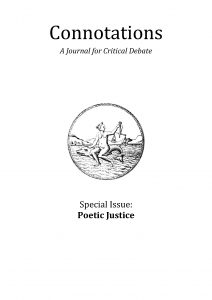Poetic Justice

When reading the critical literature on the topic of poetic justice, one gets the impression that these problems concerning the definition and the understanding of poetic justice have only been addressed partly and in individual contributions. The reflection on the various perspectives on poetic justice—legal, ethical, aesthetic, and perhaps other—in the realm of English literature may bring about some notion and concept of the term that is satisfactory both with regard to theory and an improved understanding of specific texts. This approach embraces questions about the relationship of legal trespasses, punishment, justice and mimesis in the sense of an imitation of life in literature as much as the suggestion that literature is able to create another, maybe even “golden,” world. But it also leaves quite a few questions unanswered: How is the aesthetic quality of justice defined in terms of stylistic and semantic properties of texts? How can we, if at all, describe the connection of law and justice in relation to a literary text and the action it represents? And has, as some critics have claimed (cf. Kaul; Zach), poetic justice become obsolete with modernity? Or does it live on, but in a transformed way, as Gaskell’s novel seems to suggest? And if so, does this transformation consist merely in an asymmetry: whereas Rymer’s definition was based on a symmetrical relationship, namely the reward of the good and punishment of evil, in modern times, the insecurity as to what is good prevails as much as the demand for the punishment of evil? Are these general tendencies? These questions show that the concept of poetic justice, despite its origin in antiquity, still requires rather a lot of answers that a single reader of literature cannot even attempt to provide.
From: Angelika Zirker, “Poetic Justice: A Few Reflections on the Interplay of Poetry and Justice”
Articles in this special issue
- Poetic Justice: A Few Reflections on the Interplay of Poetry and Justice
Angelika Zirker
Connotations Vol. 25: 135-51 - “When Mercy Seasons Justice”: Poetic Justice in Comedy
Burkhard Niederhoff
Connotations Vol. 25: 152-73 - Poetic (In-)Justice in Comedy1)
David Fishelov
Connotations Vol. 25: 175-97 - Poetic Justice and the Disguises of Edgar in King Lear
Maurice Charney
Connotations Vol. 25: 198-208 - Poetic Injustice in Shakespeare’s King Lear and The Tempest
Thomas Kullmann
Connotations Vol. 25: 209-24 - Parcipatory Grace: Calvinism, Pragmatism, and the Ethics of Grace in Marilynne Robinson’s Gilead
Neil Browne
Connotations Vol. 25: 225-43